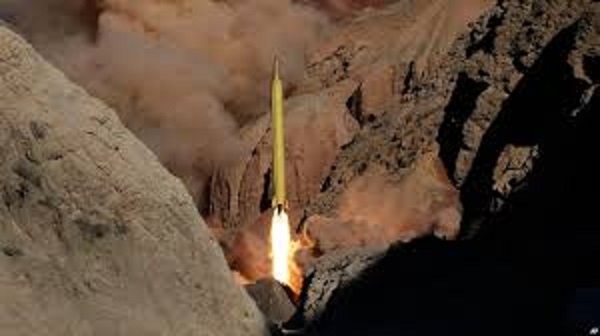The Sunday night missile attacks on the ISIS terrorist group's positions in Syria's Deir ez-Zor by Iran's Islamic Revolutionary Guard Corps (IRGC) were not simply a retaliation to the June 7 terrorist attacks in Tehran by the terrorist group that targeted the Iranian parliament and the shrine of the founder of the Islamic Republic Imam Khomeini, but also a new page of Tehran's ongoing war against regional terrorism.
The Islamic Republic has been engaged in fight against terrorism for the past four decades of its life, with the last decade having a greater significance. However, the IRGC's missile strikes launched from the Iranian soil into the Syrian territory is an unprecedented step.
Especially in recent years, Tehran has involved even more in war against the Salafi terrorism in the region through offering advisory service to the regional allies. But the recent regional developments have pushed the Iranian leaders to decide that they have to strike ISIS by missiles in Syria, some hundreds of kilometers away from Iran.
Deir ez-Zor was picked for the targeting for some strategic as well as symbolic reasons. The city has been under the terrorist group's encirclement for the past three years, with some of the Syrian army's troops are locked in the city and resisting the terrorists' push against the civilians there.
The American forces in present year have hit the Syrian forces' positions several times, facilitating consequent major ground assaults against the government forces by ISIS fighters. However, these attacks have so far proved a failure on the strength of firm resistance by the Syrian troops.
As the ISIS loses ground to government forces in Syria's Raqqa and Iraq's Mosul, both strongholds for the terrorist group in the two neighboring countries, it turns head to Deir ez-Zor where it thinks it can choose it as its last concentrated base. In past few days, the media reports suggested arrival of big numbers of ISIS fighters to the largest city in eastern Syria.
The missile assault against the terrorist group in Deir ez-Zor dealt a heavy blow to ISIS, and the analysts say it can hardly rebuild its earlier power after the strike. One of the crucial aims of the Iranian attack could be an effort to preclude the group from concentrating and organizing its forces in the city.
On the other side, Deir ez-Zor is located between two areas where the US has deployed ground troops. From northeast, the Americans are pushing towards south to reach Deir ez-Zor, after concluding Raqqa recapture operation that is underway by a coalition of Syrian opposition forces backed by Washington. If the Americans succeed in capturing Deir ez-Zor at the hands of the opposition militants, they can connect north and southeast Syria, consequently creating a huge gap between eastern Syria and western Iraq borders.
Now the Iranians have sent a clear message to the Americans and their regional allies, telling them that they will not allow them to cut the connection on the Syrian and Iraqi borders, and that only Syrian army forces should take under their control the besieged city.
On a regional and also international level, the IRGC missile attacks are a sincerity test for the so-called forerunners of the counterterrorism fight who claim they battle terrorism without any consideration. The global observers of anti-terror fight largely question the Western and regional parties' claim that they are honestly engaged in the fight, and call on them to stand by Iran's campaign against terror if they are real in their intentions. But experts note that the American measures in Syria not only lack the intention to defeat ISIS butt also Washington exploits this and other groups in the region for its own goals materialization. The day Iran announced its anti-ISIS missile strikes, the US shot down a Syrian bomber operating over Raqqa to bomb ISIS sites in the northern city. The pilot was reported killed.
The highly double-standard and instrumental view of the US to terrorism in Syria and illegal deployment of military forces to the Syrian territories- just unlike Damascus allies whose presence is requested to by the legitimate Syrian government- only largely reinforces determination of the pro-Syrian Axis of Resistance to counter the Western plans for the war-ravaged country.
Following the Iranian attack, the high-ranking IRGC commanders made it clear that the strikes on ISIS Deir ez-Zor sites carried messages also for the terrorist group's supporters. The attacks appeared to be so surprising and heavy-handed that after three days, the terrorist failed to react clearly.
It terms of the marginal signals, the strikes were influential. Before the operation, some sides, majorly those hostile to Iran in the region and beyond, used to cast doubts on the Iranian missile capabilities, beside a media propaganda campaign against Iran's missile program. But now, with the missile attacks conducted, their doubts can be seen cleared up.
More messages were sent by the anti-ISIS attack by Tehran officials: The Islamic Republic is serious when it comes to protection of its security and spares no efforts to guarantee that. This is an emphasis by Tehran on firm standing in self defense as it did during the Saddam-led war against the Islamic Republic in the 1980s.
LINK: https://www.ansarpress.com/english/7250
TAGS:































 Violation of the sovereignty and rights of afghan citizens by America
Violation of the sovereignty and rights of afghan citizens by America




